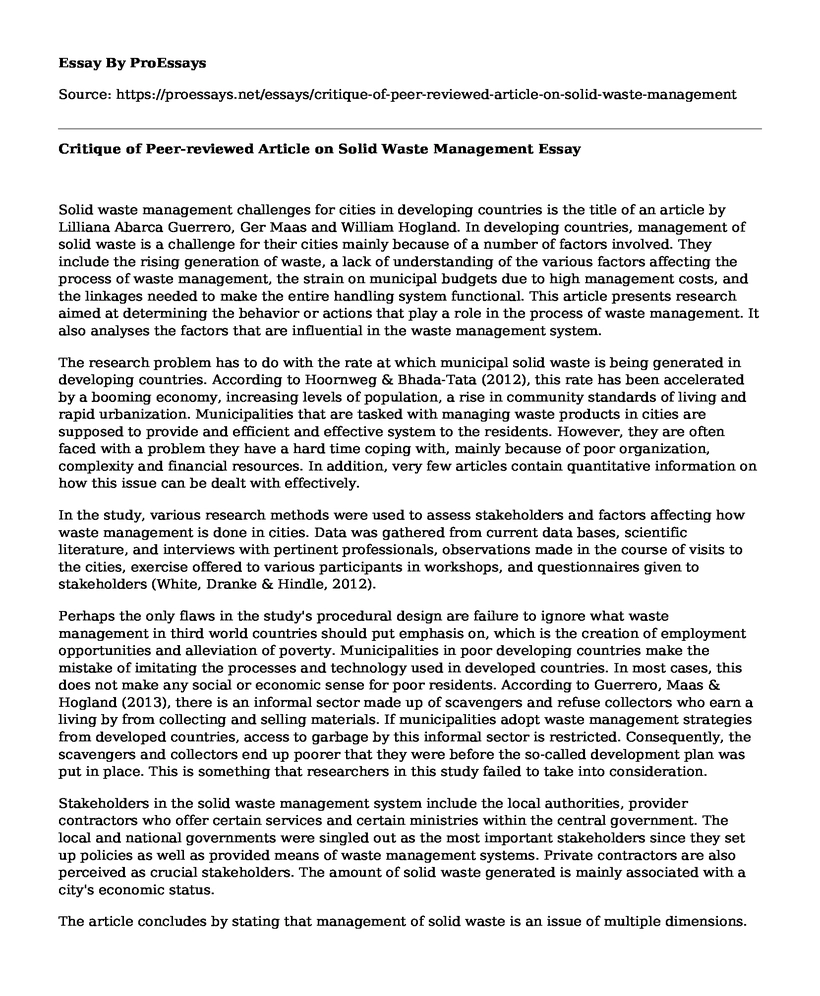Solid waste management challenges for cities in developing countries is the title of an article by Lilliana Abarca Guerrero, Ger Maas and William Hogland. In developing countries, management of solid waste is a challenge for their cities mainly because of a number of factors involved. They include the rising generation of waste, a lack of understanding of the various factors affecting the process of waste management, the strain on municipal budgets due to high management costs, and the linkages needed to make the entire handling system functional. This article presents research aimed at determining the behavior or actions that play a role in the process of waste management. It also analyses the factors that are influential in the waste management system.
The research problem has to do with the rate at which municipal solid waste is being generated in developing countries. According to Hoornweg & Bhada-Tata (2012), this rate has been accelerated by a booming economy, increasing levels of population, a rise in community standards of living and rapid urbanization. Municipalities that are tasked with managing waste products in cities are supposed to provide and efficient and effective system to the residents. However, they are often faced with a problem they have a hard time coping with, mainly because of poor organization, complexity and financial resources. In addition, very few articles contain quantitative information on how this issue can be dealt with effectively.
In the study, various research methods were used to assess stakeholders and factors affecting how waste management is done in cities. Data was gathered from current data bases, scientific literature, and interviews with pertinent professionals, observations made in the course of visits to the cities, exercise offered to various participants in workshops, and questionnaires given to stakeholders (White, Dranke & Hindle, 2012).
Perhaps the only flaws in the study's procedural design are failure to ignore what waste management in third world countries should put emphasis on, which is the creation of employment opportunities and alleviation of poverty. Municipalities in poor developing countries make the mistake of imitating the processes and technology used in developed countries. In most cases, this does not make any social or economic sense for poor residents. According to Guerrero, Maas & Hogland (2013), there is an informal sector made up of scavengers and refuse collectors who earn a living by from collecting and selling materials. If municipalities adopt waste management strategies from developed countries, access to garbage by this informal sector is restricted. Consequently, the scavengers and collectors end up poorer that they were before the so-called development plan was put in place. This is something that researchers in this study failed to take into consideration.
Stakeholders in the solid waste management system include the local authorities, provider contractors who offer certain services and certain ministries within the central government. The local and national governments were singled out as the most important stakeholders since they set up policies as well as provided means of waste management systems. Private contractors are also perceived as crucial stakeholders. The amount of solid waste generated is mainly associated with a city's economic status.
The article concludes by stating that management of solid waste is an issue of multiple dimensions. Generally, municipalities look up to equipment as a tool for finding solutions to various problems that they face. According to this study, an effective system is not just based on technological solutions. It also has something to do with social cultural, environmental, institutional, legal and economic issues that should be incorporated so that the overall system can function.
References
Guerrero, L. A., Maas, G., & Hogland, W. (2013). Solid waste management challenges for cities in developing countries. Waste management, 33(1), 220-232.
Hoornweg, D., & Bhada-Tata, P. (2012). What a waste: a global review of solid waste management.
White, P., Dranke, M., & Hindle, P. (2012). Integrated solid waste management: a lifecycle inventory. Springer Science & Business Media.
Cite this page
Critique of Peer-reviewed Article on Solid Waste Management. (2021, Mar 11). Retrieved from https://proessays.net/essays/critique-of-peer-reviewed-article-on-solid-waste-management
If you are the original author of this essay and no longer wish to have it published on the ProEssays website, please click below to request its removal:
- Ethics in Organizational Decision-Making
- Wine Producing Regions in the World Essay
- Adapting Crops to Local Conditions for Maximum Yields - Essay Sample
- Research Paper on Environmental Globalization: Strengthening, Expanding & Developing Global Networks
- Assignment Example on Mind Guard: A Symptom in Group Dynamics
- Restoring Forests to Balance Climate Change & Development - Essay Sample
- Essay on Eliminating Poverty and Controlling Pollution: Fiscal Spending Objectives







